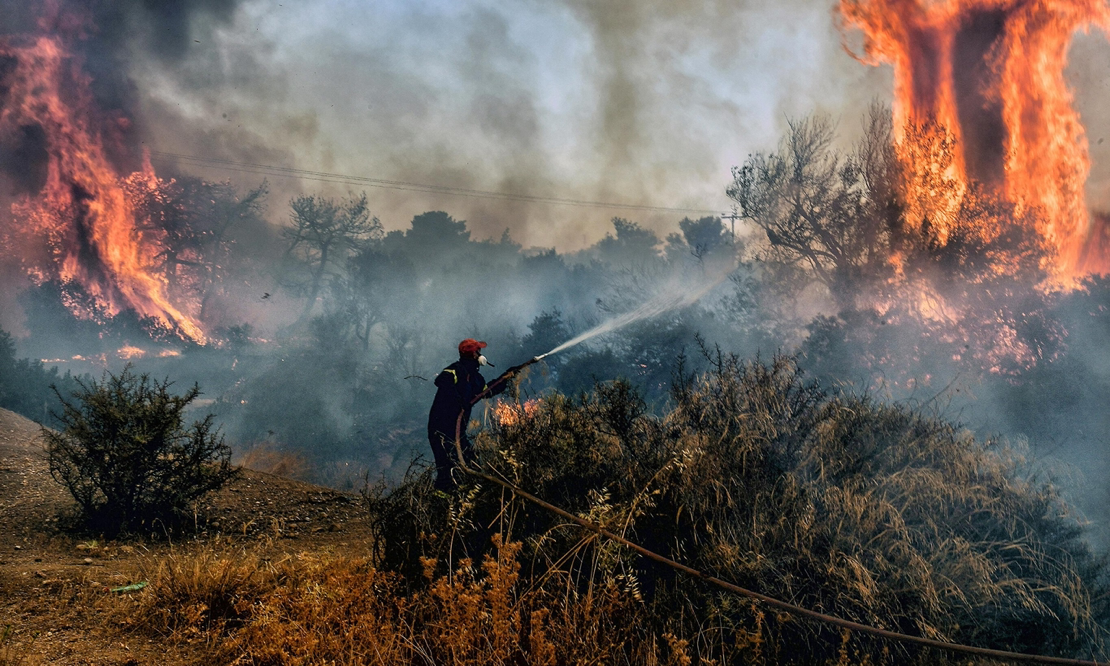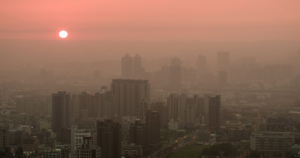Extreme weather is ‘smacking us in the face’ with worse to come, but a ‘tiny window’ of hope remains, say leading climate scientists
he record-shattering heatwaves, wildfires and floods destroying lives in the US, Europe, India, China and beyond in 2023 have raised an alarming question: have humanity’s relentless carbon emissions finally pushed the climate crisis into a new and accelerating phase of destruction?
The issue is being strongly debated, with accusations of doom-mongering being countered with charges of complacency. The answer matters: how bad is it, and how can we limit the damage? To find out, the Guardian asked 45 leading climate scientists from around the world. We also asked the equally vital question of whether extreme weather events were hitting people faster and harder than expected.
The scientists told us that, despite it certainly feeling as if events had taken a frightening turn, the global heating seen to date was entirely in line with three decades of scientific predictions. Being proved right was cold comfort, they said, as their warnings had so far been largely in vain.
Increasingly severe weather impacts had also been long signposted by scientists, although the speed and intensity of the reality scared some. The off-the-charts sea temperatures and Antarctic sea ice loss were seen as the most shocking.
The feeling of entering a new age of devastation was the result of the return of the natural El Niño phenomenon, which has temporarily turbocharged global heating, they said. Another factor was many people being confronted with extreme weather they had never experienced before, as climate impacts began to clearly stand out from usual weather.
The scientists were clear the world had not yet passed a “tipping point” into runaway climate change, but some warned that it got ever closer with continued heating.
The scientists also warned that the “crazy” extreme weather of recent months was just the “tip of the iceberg” compared with the even worse impacts to come. In just a decade the exceptional events of 2023 could be a normal year, unless there is a dramatic increase in climate action. Some further warned that the tendency of climate models to underestimate extreme weather meant we were “flying partially blind” into a future that could be even more catastrophic than anticipated.
However, a “tiny window” of opportunity remained open to tackle the climate crisis, they said, with humanity having all the tools needed. The researchers overwhelmingly pointed to one action as critical: slashing the burning of fossil fuels down to zero.
“Climate science’s projections are pretty robust over the last decades. Unfortunately, humanity’s stubbornness to spew out ever-higher amounts of greenhouse gases has also been pretty robust,” said Prof Malte Meinshausen, of the University of Melbourne, Australia.
‘Crazy off-the-charts records’
The temperature of the planet is driven by two factors: the heat trapped by the ever-growing concentration of greenhouse gases emitted by human activities and, to a lesser extent, natural climate variation. Carbon emissions were already driving up temperatures faster than for thousands of years, and the re-emergence of the natural El Niño phenomenon in 2023 is adding a further boost.
“While some of the records being set in 2023 are just crazy off-the-charts, everything is actually tracking within the range of projections of how Earth would respond to increasing greenhouse gas emissions – projections we’ve had now for the last 30-plus years,” said Prof Matthew England, of the University of New South Wales (UNSW), Australia.
Dr Shaina Sadai, of the Union of Concerned Scientists in the US, said: “This year has been disturbing with the severe, unrelenting and record-breaking heat, but it is in line with what climate scientists and climate models have long predicted.”
“The temperature increase has particularly accelerated since about the 1960s [as emissions accelerated] and is continuing to rise steadily,” said Prof Jana Sillmann, of Hamburg University in Germany.
But the scientists said there was no evidence for any sudden, new acceleration.
“[Global] warming is remarkably steady, and that’s bad enough,” said Prof Michael Mann, of the University of Pennsylvania, US. “There is no reason to invent an ‘acceleration’ that isn’t there to make the case for urgency. The impacts of warming make the case for urgency.”
“A jump in temperatures was expected when shifting to El Niño,” said Dr Mika Rantanen, of the Finnish Meteorological Institute in Helsinki.
Sorry we can’t display this here yet
“The swings from year to year due to natural variability mean that global temperatures rise like a staircase, rather than a straight line, and we’re seeing a big step up so far this year,” said Prof Julie Arblaster, of Monash University, Australia. “Some of the changes observed in the last few months have been quite shocking, from the record-breaking ocean temperatures to record low Antarctic sea ice extent.”
The current level of extreme weather impacts boded ill for the future as emissions continued to be pumped into the atmosphere, the scientists said. “Unfortunately, these new records will not last. Global warming will push records into the unknown sooner rather than later,” said Dr Raúl Cordero, until recently at the University of Santiago, Chile.
“July has been the hottest month in human history and people around the world are suffering the consequences,” said Prof Piers Forster, of the University of Leeds, UK. “But this is what we expected at [this level] of warming. This will become the average summer in 10 years’ time unless the world cooperates and puts climate action top of the agenda.”
Many of the scientists were blunt about our future prospects. Prof Natalie Mahowald, of Cornell University, US, said: “What we are seeing this year is just the tip of the iceberg, so to speak, of what we expect to happen.” Meinshausen said: “If we do not halt global warming soon, then the extreme events we see this year will pale against the ones that are to come.”
‘Living the predictions’
While the scientists were clear that overall global heating was playing out as predicted, their views on whether the extreme weather impacts were hitting faster and harder than expected were more varied as they encompassed a wider range of factors.
“The impacts are frighteningly more impactful than I – and many climate scientists I know – expected,” said Prof Krishna AchutaRao, of the Indian Institute of Technology, Delhi. Prof Francisco Eliseu Aquino, of the Federal University of Rio Grande do Sul, Brazil, said: “I have also been scared by these extreme events in the last weeks and months. They are more intense and going beyond what we expected for this decade.”
“My expertise is in heatwaves, and I’m not surprised most of the northern hemisphere has had heatwaves this summer, but the intensity is greater than I expected,” said Sarah Perkins-Kirkpatrick, an associate professor at UNSW. “We are hitting record-breaking extremes much sooner than I expected. That’s frightening, scary and concerning, and it really suggests that we’re not as aware of what’s coming as we thought we were.”




